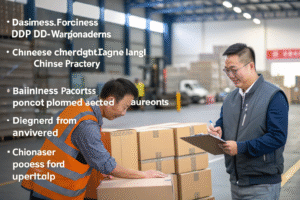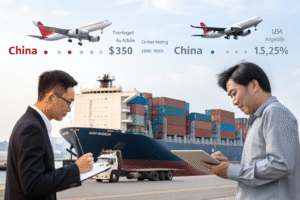If your business relies on goods moving across oceans, your supply chain is only as strong as its weakest link. One late vessel, a customs snag, or a missing truck can throw your inventory off balance and leave your shelves looking bare. Importers without reliable freight partners often pay the price with frustrated customers and shrinking margins.
Freight forwarding is crucial for inventory stability because forwarders keep supply chains steady with locked-in shipping schedules, hands-on customs support, and door-to-door reliability. They bring importers visibility, predictability, and peace of mind—things you can’t afford to lose when customers are waiting.
If keeping inventory steady feels like juggling fire, forwarders are the safety net that makes sure you don’t get burned.
How do freight forwarders prevent stockouts?
Stockouts are a nightmare for anyone running a global supply chain. One missed shipment can spiral into canceled orders, angry buyers, and bruised reputations. Forwarders step in as the stabilizers, making sure goods move without hiccups.
They prevent stockouts by locking in vessel space, pre-booking air cargo, and clearing customs before bottlenecks hit. Their experience dealing with chaos means your supply chain doesn’t grind to a halt.

How do forwarders secure transport capacity?
Because they manage cargo for a ton of clients, forwarders have the bargaining power to snag container slots and flight space even when the market is tight. Insights from The Journal of Commerce and IATA prove this leverage can be the difference between stocked shelves and lost sales.
Can customs clearance delays cause stockouts?
Big time. Customs issues can choke your entire flow of goods. Forwarders cut this risk by filing paperwork early and leaning on their local contacts at ports. References like U.S. Customs and Border Protection and WCO explain the compliance steps forwarders master to keep cargo moving.
Do freight forwarders help balance inventory levels?
Too little stock hurts sales, but overstocking can strangle cash flow. Forwarders help importers walk that fine line by syncing shipments with actual demand instead of random schedules.
They balance inventory by offering flexible transport modes, bundling smaller shipments, and arranging staggered arrivals. This way, goods hit your warehouse when you need them—not months too soon or weeks too late.

How does consolidation support balance?
By consolidating smaller loads into one full container, forwarders keep costs down and make deliveries match up with your sales cycles. Resources like Maersk and Investopedia on Freight Consolidation show why this strategy keeps inventory lean without starving your shelves.
Can forwarders support just-in-time supply chains?
Definitely. Just-in-time systems only work when logistics partners deliver with clockwork precision. Forwarders sync shipping calendars with production runs to prevent costly overstock. Studies from Supply Chain Digital and Transport Topics prove that dependable logistics is the backbone of JIT success.
How do freight forwarders boost visibility in supply chains?
Flying blind in logistics is a recipe for disaster. Without visibility, you’re stuck guessing when shipments will land and hoping stock shows up on time. Forwarders flip the light switch.
They boost visibility with real-time tracking tools, milestone updates, and straight-shooting communication. That clarity lets importers adjust plans before inventory slips off track.

What digital tools do forwarders use?
Most modern forwarders run platforms like CargoWise or Project44 that show cargo location minute by minute. This data helps importers decide whether to rush, delay, or redirect stock before it snowballs into a problem.
Why is proactive communication valuable?
Because not every hiccup shows up in an app. A forwarder’s real value is calling you before a delay bites. Articles from Freightwaves and InBound Logistics stress how proactive updates give importers time to re-route or adjust before customers even notice.
Why do stable logistics create customer trust?
Inventory isn’t just numbers in a warehouse—it’s your promise to customers. Empty shelves or late deliveries send the signal that your brand can’t be trusted. Forwarders make sure that doesn’t happen.
They guard your reputation by keeping goods arriving in full, on time, and in top condition. That stability is what keeps customers loyal.

How do forwarders protect brand reputation?
By eliminating shortages and delays that ruin shopping experiences. Studies from Harvard Business Review and Supply Chain Brain show that steady logistics directly translate into customer trust.
Can reliable logistics drive loyalty?
Yes. Shoppers remember who keeps products on shelves. Importers that partner with sharp freight forwarders enjoy repeat orders and long-term loyalty. Insights from Logistics Management and Transport Topics highlight how consistency in logistics builds repeat business.
Conclusion
Inventory stability isn’t optional—it’s survival. Freight forwarders secure space with carriers, balance shipments with demand, shine a light on supply chains, and protect your reputation with steady deliveries. For importers sourcing from China to the U.S. or Europe, forwarders aren’t just another vendor. They’re the anchor that keeps your supply chain steady and your business thriving.









